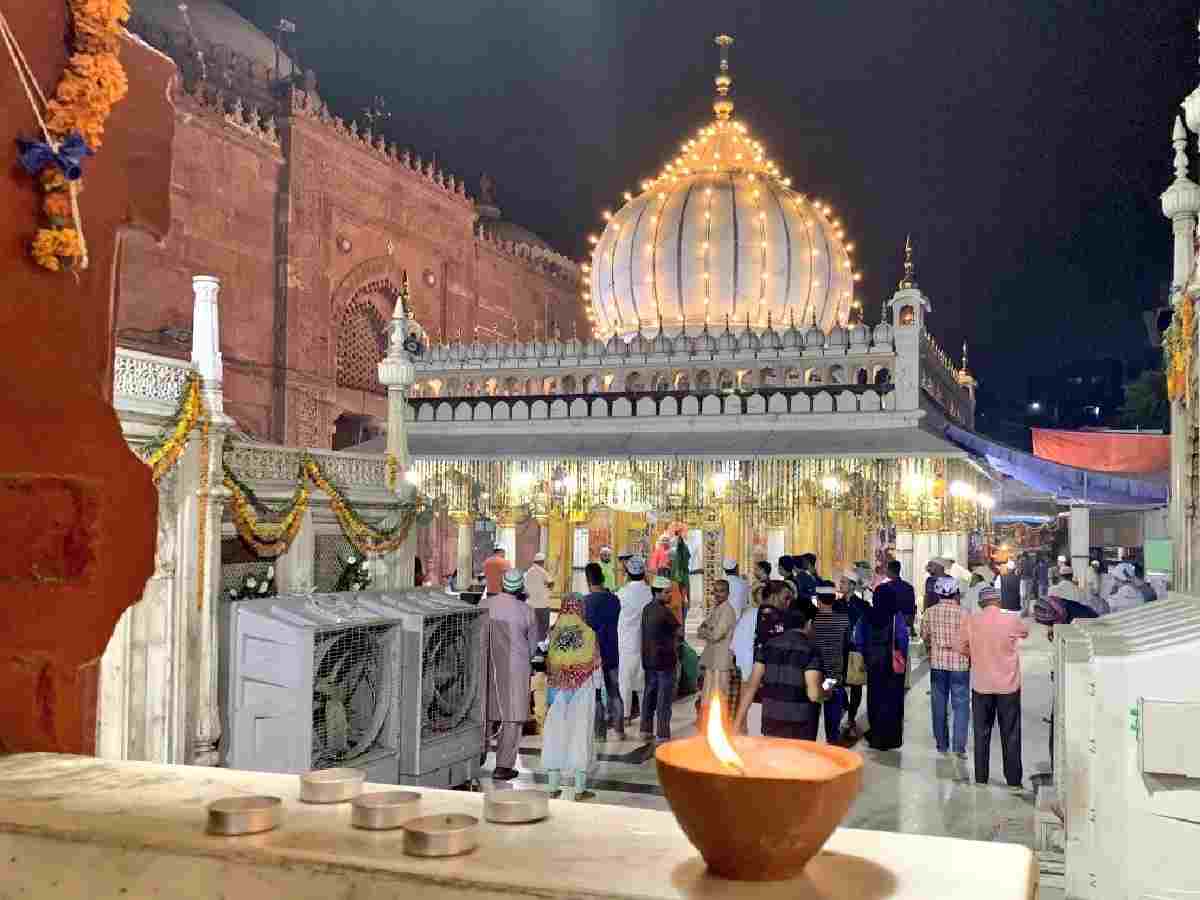
Dargah Nizamuddin Aulia
Following in his father’s footsteps, Imam Umer Ilyasi, a prominent Islamic scholar and advocate of the interfaith movement in India, continues the tradition of lighting diyas outside the Gol Masjid at Kasturba Gandhi Marg. This practice, initiated by his father, Maulana Jameel Ilyasi, founder of the All India Imam Conference, has been an integral part of Diwali celebrations since the 1960s.
Maulana Umer Ilyasi, the Imam of Gol Masjid, emphasises the inclusive nature of Diwali. “The festival of lights inspires us to move from darkness to light. Diwali should not be considered as a festival belonging to one particular community.
Diwali’s joyous spirit is celebrated across communities in Delhi, transcending religious lines. One such example is the Brothers House at Civil Lines, established in 1925 and home to several unmarried priests. Despite their Christian background, the residents illuminate their residence and the affiliated institutions on Diwali.
According to Brother Solomon George, “Festivals like Diwali, Eid, and Christmas have now transcended religious boundaries. They are celebrated by all. It symbolises the victory of light over darkness.” The Brotherhood of the Ascended Christ, founded in India in 1877, has strong ties to Cambridge University. This institution is responsible for the founding of St. Stephen’s College, St. Stephen’s Hospital, and St. Stephen’s Cambridge School on the Delhi-Sonipat border, now part of the Delhi Brotherhood Society (DBS).
Also Read: The fading tradition of shakkar ke khilone in Old Delhi’s Diwali celebrations
“We celebrate Christmas, Diwali, Eid, and national festivals like Republic Day and Independence Day with our students,” adds Brother George. “Our aim is to demonstrate that pluralism is the cornerstone of our country.”
Judaism, though more commonly associated with Israel, also has a rich history in India, with Jews celebrating Diwali in various parts of the country. The Judah Hyam Synagogue, located on Humayun Road in Delhi, prepares for Diwali by lighting diyas the day before the festival. As the only synagogue in North India, it stands as a symbol of the Indian Jewish community’s engagement with the nation’s cultural and religious diversity.
Rabbi Ezekiel Isaac Malekar, who lights diyas outside the synagogue with his family and friends, remarks, “How can we stay away from Diwali when we live in India? It is impossible. Diwali is a festival of love, brotherhood, and leading oneself from darkness to light. We are Jewish, but we are also a part of this India.”
In a show of India’s syncretic traditions, Muslims across the country also join in Diwali celebrations. The Dargah Matka Pir on Mathura Road, for instance, follows the custom of lighting diyas on Diwali. Maulana Qayuum Abbasi of Dargah Matka Pir states, “Muslims are very much a part of the Diwali celebrations of this nation.” This tradition, shared by Muslim communities, extends to other iconic sites like the Haji Ali Dargah in Mumbai, where Diwali decorations and diyas light up the sacred spaces.
Similarly, the Dargah Hazrat Nizamuddin Aulia, one of the most venerated Sufi shrines in India, has been illuminated for Diwali for over 25 years. Sheikh Jilani, involved in the shrine’s administration, recalls, “In the early years, we made rangoli with flowers. Later, we began lighting diyas too.” Since 2022, the dargah has even been lit on Dhanteras, making the festival an even more inclusive celebration. The spectacle of the shrine adorned with diyas draws people from all walks of life, who visit throughout the night.
At Jamia Millia Islamia (JMI), the celebrations of Diwali are a vivid demonstration of India’s pluralistic culture. The Vice Chancellor’s office, administrative block, Nehru Centre, and hostels are adorned with lights, while students, teachers, and staff come together to create intricate rangolis. The illumination of the campus, which stretches across both sides of the road, creates a mesmerising scene of milky white light, attracting passersby to stop and admire the festive decorations.
The roots of Diwali celebrations at Jamia go back to the time of Dr Zakir Husain, the institution’s former Vice Chancellor. According to Feroz Ahmed Bakht, former Chancellor of Maulana Azad National Urdu University, “The tradition of celebrating Deepavali at Jamia began during Dr Zakir Husain’s tenure. He personally oversaw the preparations. The practice continued under Dr Mushirul Hasan, an eminent historian and Vice Chancellor, who further strengthened it.”
Dr Mushirul Hasan’s vision for Jamia was rooted in secularism. He believed the institution, founded with the blessings of Mahatma Gandhi, should embody the values of pluralism and send a message to the world that India’s path would always be one of secularism. “That is why the Jamia fraternity celebrates Diwali with the same enthusiasm and warmth as they celebrate Eid,” notes Bakht.
The likely Rs 1,000 crore sale of the Tehri Garhwal House, former royal residence on…
On the principle of 'Sarvajan Hitaya, Sarvajan Sukhaya' -- Welfare for all, Happiness for all…
With hundreds reported missing in Delhi this year, this guide explains how families can use…
The case came to light after a 35-year-old woman from Panipat alleged that she had…
During the investigation, CCTV footage helped identify the suspects, according to Delhi Police
The launch took place during the inauguration of the Delhi Police Exhibition Hall at Connaught…